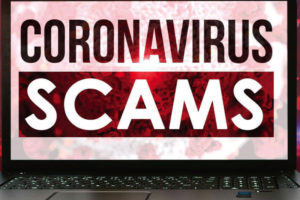Protect yourself from coronavirus fraud

Restrictions implemented to prevent the spread of the
novel coronavirus COVID-19 have saved untold numbers
of lives. The world has adjusted to such restrictions, and
many parts of the world have relaxed measures as case numbers
have declined.
As communities begin returning to some semblance of
normalcy, the Centers for Disease Control and Prevention has
warned people against letting their guard down. While many
of those warnings pertain to the importance of continuing to
practice social distancing as economies reopen, advisories also
include notices about fraud schemes related to COVID-19.
The U.S. Department of Health and Human Services Offi ce of
the Inspector General has advised the general public about scams
involving Medicare fraud. Such schemes are targeting Medicare
benefi ciaries in an assortment of ways, including through text
messages, social media, telemarketing calls, and even door-to-door
visits. When perpetrating such frauds, scammers seek benefi ciaries’
personal information, which they then use to fraudulently bill
federal health care programs, potentially leaving their victims on
the hook for costly unapproved tests related to COVID-19.
The CDC notes the importance of being aware of such schemes.
Awareness can help consumers avoid being victimized by
scammers, and the following are some additional measures people
can take to protect themselves from COVID-19-related fraud.
· Do not share personal account information.
· Do not take callers or visitors at face value.
· Never click on links in emails or text messages.
· Ignore off ers or advertisements for COVID-19 testing or
treatments on social media sites.
The COVID-19 outbreak has made it easy for criminals to
exploit consumers concerned about their health. Consumers
who suspect COVID-19 fraud can contact the National Center for
Disaster Fraud Hotline at (866) 720-5721 or visit Justice.gov/
DisasterComplaintForm to fi le a complaint.
